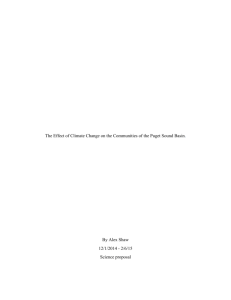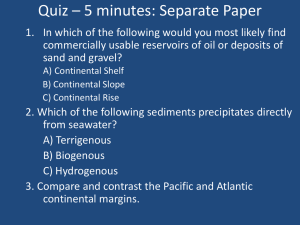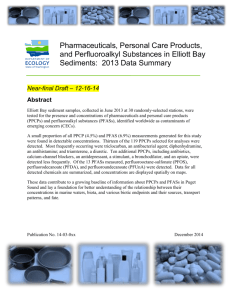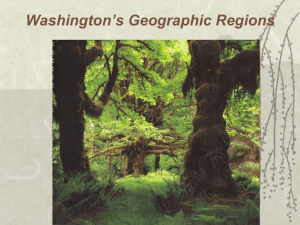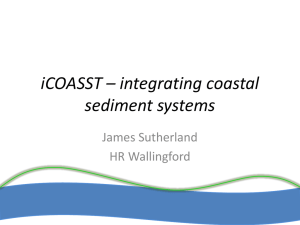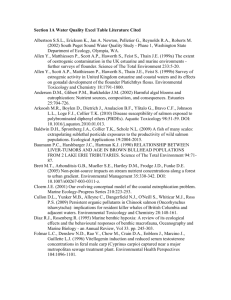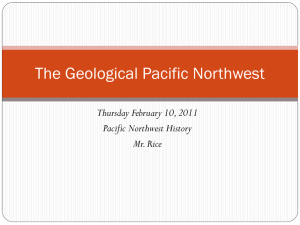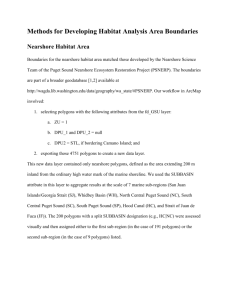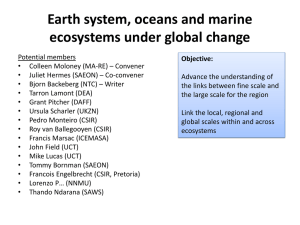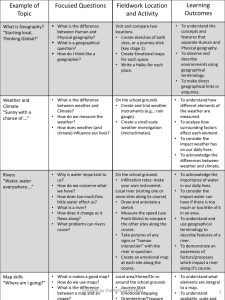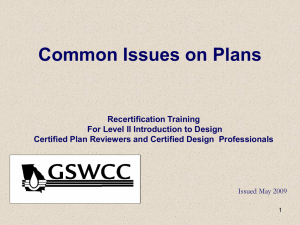Salmon Recovery in Washington
advertisement
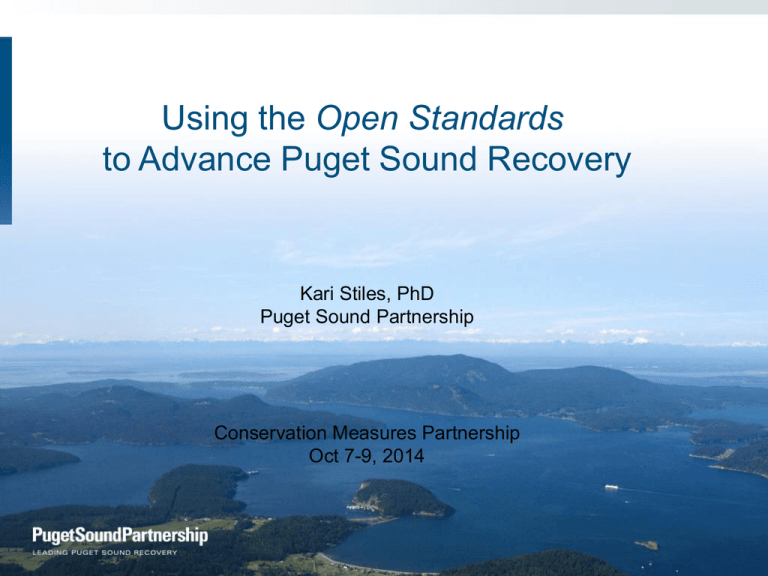
Using the Open Standards to Advance Puget Sound Recovery Kari Stiles, PhD Puget Sound Partnership Conservation Measures Partnership Oct 7-9, 2014 • National Estuary Program (EPA) • • • • • 16,500+ sq miles International border 12 counties 100+ cities 20+ tribes Snowcaps to Whitecaps … with a focus on the watery bits Recover Puget Sound by 2020 “swimmable, fishable, diggable, drinkable” 6 goals: Habitat Species Water Quality Water Quantity Human Health Human Well Being Puget Sound restoration and protection (2007) Washington State Statute at RCW 90.71.200(2) • Puget Sound Partnership: coordinate and lead the effort to restore and protect Puget Sound. The partnership will: – Define a strategic action agenda (2-year cycle) • prioritizing necessary actions, both basin-wide and within specific areas • addressing complex connections among land, water, species, human needs • based on science • include clear, measurable goals for the recovery of Puget Sound by 2020 – Determine accountability for performance, oversee the efficiency and effectiveness of money spent – Educate and engage the public – Track and report results to the legislature, the governor, and the public – Not have regulatory authority • Partners: All governmental entities, including federal and state agencies, tribes, cities, counties, ports, and special purpose districts – Support and help implement the partnership's recovery efforts PUGET SOUND RECOVERY CONTEXT 2008 Death by 1,000 cuts Recovery by 1,000 uncoordinated actions Locals Region watersheds action areas (cities, counties tribes, NGOs) State feds 16 watershed Chinook recovery plans (NOAA) 1 regional Chinook recovery plan (NOAA) Decision makers Scientists Decision makers 2008 Actions Priorities Locals Actions Actions Actions Actions Gaps & needs Actions Actions Scientists Region Adaptive Management of Puget Sound Recovery Efforts 2009-2014 Open Standards, Miradi, Miradi Share Decision makers 2008 Region Locals Scientists Decision makers 2014 Locals Recovery Priorities Priority Threats Monitoring & Gaps Ecosystem Status Effectiveness & Impacts Scientists Region Decision makers Region Locals Scientists Common language Puget Sound Taxonomies Ecosystem & Human Wellbeing Pressures Strategic Initiatives Action Types Barriers, Corrective Actions Common tools Theories of Change (aka. Results chains) Common database Standard taxonomy for ecosystem components Status in Puget Sound Status within watershed • geographic unit ACCESSIBLE HABITAT (% OF MAINSTEM) 100% Small river channels % OF HISTORIC LENGTH 90% 75% 29% STATUS GOAL LARGE WOOD (KEY PCS/100 M) STATUS GOAL POOL FREQUENCY (#/CHANNEL WIDTH) POOR FAIR GOOD VERY GOOD 0.7 1.3 0.31 GOAL STATUS 0.27 STATUS GOAL 16 Chinook watersheds regional story CHEM-K08.06. Intertidal habitat zone - extent Extent of intertidal habitat CHEM-K08.10. Water quality CHEM-K07.01. Habitat connectivity condition CHEM-K08.03. Estuarine habitats - extent CHEM-K01.01. Coastal sediment dynamics in drift cells - condition CHEM-K04.02. Freshwater hydrology - condition CHEM-K08.02. SAV beds - extent CHEM-K08.01. SAV beds - condition CHEM-K05.01. Tidal channel formation - extent of channels CHEM-K08.08. Tidally influenced wetlands - extent CHEM-K05.02. Tidal channel formation - connectivity of channels CHEM-K04.01. Freshwater hydrology - dependent water condition CHEM-K06.01. Detritus recruitment & retention-extent CHEM-K08.05. Estuarine habitats - distribution CHEM-K01.02. Coastal sediment dynamics in drift cells - landscape context Distribution of estuarine habitat CHEM-K08.09. Tidally influenced wetlands - condition CHEM-K01.08. Coastal sediment dynamics - extent of wind and wave features CHEM-K03.01. Tidal circulation - extent of biological activity # of Estuarine & Marine Indicators by Key Ecological Attribute CHEM-K09.01. Spatial extent and continuity of riparian area CHEM-K06.02. Detritus recruitment & retention-extent of supply CHEM-K03.02. Tidal circulation - dependent water condition CHEM-K02.01. Fluvial sediment dynamics - condition CHEM-K01.03. Coastal sediment deposition & accretion - extent CHEM-K01.05. Coastal sediment deposition & accretion-condition of impoundment CHEM-K01.06. Coastal sediment supply - extent CHEM-K08.04. Estuarine habitats - condition CHEM-K01.07. Coastal sediment supply - distribution CHEM-K08.07. Intertidal habitat zone - condition CHEM-K09.02. Riparian community structure Riparian community structure CHEM-K01.04. Coastal sediment deposition & accretion-condition of sediment CHEM-K01.09. Coastal sediment dynamics - condition of wind and wave features CHEM-K09.03. Riparian function 0 5 10 15 20 25 30 35 Puget Sound: Vital Signs linked to Ecosystem Components Estuaries Chinook watersheds contribute to regional goals Shellfish Beds 2009 Puget Sound Threats and Soundwide Rating X Puget Sound Pressure Taxonomy SOURCES of pressure on Puget Sound ecosystems and people (41) STRESSORS - proximate actors on ecosystem (47) SOURCE – STRESSOR DIAGRAMS illustrating source-stressor relationships Pathways of Effect (Stressed) Pressure (Source) Development source of acts on Stressor Stressor Stressor Land conversion Ecosystem Component Reduced floodplain habitat extent Chinook watersheds & Puget Sound pressures Stormwater Roads & railroads Marine shoreline armoring Runoff from residential and commercial lands Roads & Railroads (Including Culverts) Marine shoreline infrastructure Marine Levees, Floodgates, Tidegates Housing & Urban Areas Abstraction of ground water Marine & Freshwater Finfish Aquaculture Logging & Wood Harvesting Fishing & Harvesting Aquatic Resources Agricultural & Forestry Effluents Abstraction of surface water Annual & Perennial Non-Timber Crops Recreational Activities Freshwater shoreline infrastructure Commercial & Industrial Areas (Including Ports) Sewer - Domestic & Municipal Wastewater to Sewer Oil Spills Mining & Quarrying Livestock Farming & Ranching Freshwater Levees, Floodgates, Tidegates Dams Utility & Service Lines Shipping Lanes and Dredged Waterways Tourism & Recreation Areas Onsite Sewage Systems (OSS) Industrial Runoff Air-Borne Pollutants/Climate Change Release of Excess Energy (light, heat, sound) Industrial Wastewater Marine shellfish aquaculture Wood & Pulp Plantations War, Civil Unrest & Military Exercises Garbage & Solid Waste Fire & Fire Suppression Renewable (e.g. Tidal) Energy Hunting & Collecting Terrestrial Animals Invasive species and other problematic species Gathering Terrestrial Plants Flight Paths Dams Utility Lines Onsite Sewage Systems Invasive Species 0 10 20 30 40 50 (%) 60 70 80 90 100 Pressure Intrinsic Vulnerability Ecosystem Endpoint Assessment units: watershed marine basin Puget Sound Potential Impact Pressures Pressures posing greatest risk (Puget Sound example) Land Cover Conversion – Development - Transp. & utilities Large Spills Ecosystem Components & KEAs Most vulnerable parts of the ecosystem (Puget Sound example) Cuthroat Trout Coho salmon Chinook salmon Riparian vegetation Small, high-gradient streams species habitats & processes Theories of Change: Actions linked to desired outcomes All 16 Chinook watershed plans (2005) (2005 plans expect lots of miracles) 2014-2015: Regional “Implementation Strategies” focused on key Vital Signs Theories of Change + Puget Sound Taxonomies 2016 and beyond Refine common language • multi-scale information sharing and assessments Refine and apply common tools • improve prioritization of recovery goals, pressures, actions and science needs Develop Steelhead recovery plan (NOAA) Develop regional theories of change (“Implementation Strategies”) as basis for • 2016 Action Agenda • 2016 Biennial Science Work Plan • Effectiveness Assessment • (2015 &) 2017 State of the Sound reporting
